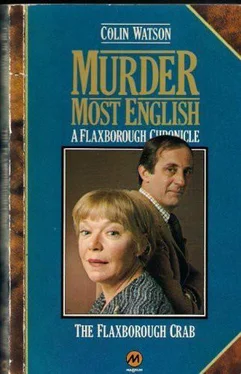Policewoman Bellweather frowned. “Don’t you think it would have been wiser to telephone straight away, Mrs Pasquith? It’s rather late for us to do anything about the man now.”
“Yes, but you see I didn’t really like to. I didn’t know, what people might think. I mean, he’d said all those horrible things and I couldn’t be sure that he wouldn’t tell lies if somebody came and caught him. Lies about me, I mean. Well, they do, don’t they? And I’m on the flower committee and everything, you see.”
The policewoman did not see. “But if he had told lies, it’s most unlikely that they would have been believed surely?”
Mrs Pasquith puckered her flower committee lips in a smile of forgiveness for Miss Bellweather’s näivete.
“When you were making for the vestry door...”
“Yes, love?”
“Did you get a better view of what the man looked like? He must have been nearer by then.”
“Well, he was, of course, but I didn’t stop to stare, I can tell you. I just sort of caught a glimpse of him out of the corner of my eye, if you see what I mean.”
“You can’t give me a description, then? Not even a rough impression?”
Mrs Pasquith shook her head regretfully, but continued to give the matter thought.
“He certainly wasn’t a young man, that’s all I can tell you.”
“How did he speak?”
“Oh, very impudent, very bold. Well, I told you...”
“No, I mean was he an educated sort of man?”
“You might call him that, yes. Well, ‘pollinate’—I mean that’s not a word that somebody ignorant would think of using, is it?”
“I suppose not,” said the policewoman.
There did not seem to be any other question she might usefully ask. The interview had been a waste of time. It had not produced a single clue to the man’s identity. So far as she could see, he hadn’t even committed a crime. Threatening words and behaviour? Possibly. Conduct likely to lead to a breach of the peace? Well, at a pinch...
“There is just one thing,” Mrs Pasquith said suddenly.
“Yes?”
“I told you I saw the man out of the corner of my eye, well, that’s right, he was just a sort of shape coming nearer, but there was something about him that I must have noticed because I thought about it later and wondered if I couldn’t have been mistaken. You see, he seemed to be coming towards me, well, sideways on, as if he didn’t have proper control over his legs.”
The policewoman took conscientious note.
“I suppose,” Mrs Pasquith concluded regretfully, as if admitting the unlikelihood of her own attractions having sparked off the drama, “that he must have been drinking.”
This explanation did not commend itself to Inspector Purbright. He sat regarding Policewoman Bellweather’s typed report with considerable gloom. A mere drunk might have got away with such behaviour once, or even twice, but it was inconceivable that his luck would have held for three forays against the modesty of Flaxborough womankind. Whoever was responsible had reserves of cunning and energy that were not provided by alcohol.
The most depressing aspect of the business was the probability that the man would continue his exploits until gossip about them induced a public scare out of all proportion to the harm of which he was actually capable.
And yet, who could say what that was? The experience of the Sweeting girl had been a good deal more serious than a brush with a randy old eccentric. And a weaker, less determined woman than Brangwyn Butters could have suffered badly in the isolation of Gorry Wood.
No, it was natural enough for people to get frightened while this sort of thing was going on in the town. It was also reasonable—and proper—for them to demand what their police force was doing about it.
The trouble was, as Purbright well knew from past experience of Flaxborough’s endemic sexual impetiuosity, that the offender invariably was unpredictable as well as wily. He also seemed to have a complacent wife, acquaintances who had the greatest difficulty in recognizing him at a distance of more than three feet, and a genius for picking victims with delayed reactions and bad memories.
The inspector’s mood was not lightened when his telephone rang and he heard the eagerly inquisitive voice of young Henry Popplewell.
“Now then, chiefy, what’s all this about the Flaxborough Crab?”
Henry, the son of Mrs Popplewell, Justice of the Peace, was the Flaxborough Citizen ’s most recently acquired and already regretted junior reporter.
“Crab?” echoed Purbright, in genuine bewilderment.
“That’s right. The whole town’s talking about him. You know—all this peeping through curtains and chasing women. We’ve got no end of stories. I’m just tying them up.”
Henry delivered this final information with the pride of some embryo Northcliffe packed umbilically with newspaper jargon.
“I think,” Purbright said, “that you’d better come along and see me, Mr Popplewell.”
“Will do,” chimed Henry.
Purbright replaced the receiver. He looked pained. He was very much afraid that Henry’s “Will do” was but a foretaste of even heartier abbreviations to come. He waited, nerves tingling, for the door to open and admit Mr Popplewell and his “Long time no see!”
At last there was a knock and Henry’s head appeared.
“Chow!”
The inspector winced.
Henry came in. Purbright pointed invitingly to a chair. Instead of sitting, Henry twirled the chair round behind him and leaned against its back in the manner of a sportsman resting on his shooting stick. He gazed jauntily round the shabby little office.
“And how’s tricks?” he asked.
It’s coming , thought Purbright, it MUST be coming .
Henry stared with open curiosity towards the papers on the inspector’s desk. He scratched under his left armpit, yawned, glanced out of the window, then fished a cigarette from the breast pocket of his jacket and lit it, frowning. He expelled smoke as if trying to blow out a candle from ten feet. This seemed to do him a lot of good. He smiled.
“Well, well—long time no see!”
Purbright swallowed and visibly relaxed.
“Mr Popplewell, you mentioned on the telephone someone or something called the Flaxborough Crab.”
“Right.”
“Who calls him that?”
“Everybody. Either that, or the Flaxborough Strangler.”
The inspector raised his brows.
“I don’t recall any reports of stranglings, Mr Popplewell.”
“Ah, you’ve not heard from that woman in Windsor Close, then? Half a tick...” Henry consulted the back of an empty cigarette packet. “Mrs Cowper, husband on the buses. No joy?”
“She’s not complained to us.”
“That figures,” said Henry cheerfully. Purbright had no idea what he meant.
“Or Mavis what’s-her-name, the waitress at the Roebuck?”
“Another strangling?”
“Do me a favour! No—knicker-snatching, that one.”
Purbright tried to resist the growing sense of confusion that was imparted by the substance and, more particularly, the manner of Henry’s conversation. He lit himself a cigarette, examined it carefully, and began:
“I gather that what you are...”
“Look,” Henry interrupted, “can you give me the dope on this peeping angle?”
“Peeping?”
“Natch. All over the place. Women daren’t go to bed.”
“Somebody looks through their windows?”
“That’s the drill. No one’s slept for a fortnight down Edward Crescent or Abdication Avenue. Hey, but you know all this! You have to know. Come on—impart!”
Henry had unpropped himself and was now pacing restlessly up and down, immediately in front of Purbright’s desk.
Читать дальше












